unit2情态动词
高一英语情态动词Unit2 Modal verbs新课标 牛津版

(常用于间接引语)
At that time we thought the story could not be true.
I could swim when I was only six. Father said I could swim in the river.
C. shouldn’t , must D. can’t , shouldn’t
8.[97] The fire spread through the hotel very
quickly but everyone ___ get out .
A. had to
B. would
C. could
D. was able to
party tomorrow. --- _______. A. I don’t B. I won’t C. I can’t D. I haven’t
7. [96] Johnny , you ___ play with the knife, you
ห้องสมุดไป่ตู้
___ hurt yourself.
A. won’t , can’t B. mustn’t , may
• Pay attention to the differences: • must have done • should/ought to have done • needn’t have done
1.[91] A computer ___ think for itself ;
it must be told what to do.
A. can’t
B. couldn’t
C. may not D. might not
高中英语外研版2019新教材必修第二册unit2语法点

情态动词(2)一、情态动词can与could的用法1. 表示能力: can用来表示现在的能力, could表示过去的能力。
I can play basketball now, but I couldn’t when I was young.现在我会打篮球了, 但小时候我不会。
2. 表示请求和许可: could语气比can委婉, 但回答时只能用can。
Can/Could you lend me a hand? 你能帮我一下吗?3. 表示推测, 意为“可能”。
多用于否定句或疑问句。
—Can he be in the reading room now?—No, he can’t be in it. Because I saw him in the office just now.——他现在可能在阅览室吗?——不, 他不可能在(阅览室)。
因为我刚刚在办公室看见他了。
4. 表示理论上或习惯上的可能性, 意为“可能会”。
Jim can be very annoying. 吉姆可能会很烦人。
二、情态动词may与might的用法1. 表示征求对方的许可或允许(不用might)对方做某事。
—May I come in? 我可以进来吗?—Yes, you may/can. 是的, 你可以进来。
—No, you can’t. You may go now.不行, 你不能进来。
你现在可以走了。
2. 表示推测(把握不大), 意为“可能”, 多用于肯定句。
might比may可能性更小。
He may come, or he may not. 他可能来, 也可能不来。
It may/might rain this afternoon. You’d bette r take a raincoat with you.今天下午可能会下雨。
你最好带上雨衣。
3. may用于祈使句, 表示祝愿。
May you succeed! 祝你成功!4. “may/might as well+动词原形”表示“不妨, 还不如”。
Unit2Let'sCelebrate!Usinglanguage情态动词课件-高中英语

stop his helpers...
表能力
3. ...we can all share the true spirit of giving at Christmas time.
4. Interestingly,the letters did not contain the usual warnings to children
be able to 则表示经过一段时间的努力后所具有的能力, 相当于manage to do或succeed in doing。
eg. This time I failed in the exam, but I’ll be able to pass the exam next time.
②现在时can与be able to没有区别,但是在过去时中二者意义不同。 eg. I can/am able to speak both English and French. eg. All the people could escape from the burning hotel last night. 昨晚所有的人都有能力从燃烧的旅馆里逃脱出来。(有这种能力,
★ sth be supposed to do意为“某事本应该……”, 用来表示某事本应发生而没有发生。
eg. The school bus is supposed to arrive fifteen minutes ago.
1. need的用法 need作情态动词时,多用于疑问句、否定句或条件句中。
(2)作实义动词 need作实义动词时,后可接名词、动名词、不定式等,有人称、时态和数的变 化,其否定形式、疑问形式都要通过助动词do构成。 eg. There are always people who need help from others.
Unit2Sportsevents情态动词II知识梳理
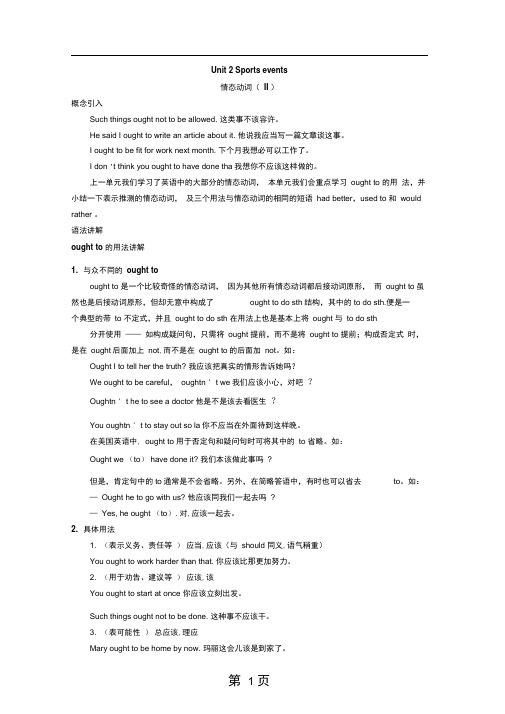
Unit 2 Sports events情态动词(II )概念引入Such things ought not to be allowed. 这类事不该容许。
He said I ought to write an article about it. 他说我应当写一篇文章谈这事。
I ought to be fit for work next month. 下个月我想必可以工作了。
I don ' t think you ought to have done tha我想你不应该这样做的。
上一单元我们学习了英语中的大部分的情态动词,本单元我们会重点学习ought to 的用法,并小结一下表示推测的情态动词,及三个用法与情态动词的相同的短语had better,used to 和would rather 。
语法讲解ought to 的用法讲解1. 与众不同的ought toought to 是一个比较奇怪的情态动词,因为其他所有情态动词都后接动词原形,而ought to虽然也是后接动词原形,但却无意中构成了ought to do sth结构,其中的to do sth.便是一个典型的带to 不定式,并且ought to do sth 在用法上也是基本上将ought 与to do sth 分开使用——如构成疑问句,只需将ought 提前,而不是将ought to 提前;构成否定式时,是在ought后面加上not,而不是在ought to的后面加not。
如:Ought I to tell her the truth? 我应该把真实的情形告诉她吗?We ought to be careful,oughtn ' t we我们应该小心,对吧?Oughtn ' t he to see a doctor他是不是该去看医生?You oughtn ' t to stay out so la你不应当在外面待到这样晚。
人教版新课标高一英语Book3unit2Healthyeating情态动词归纳
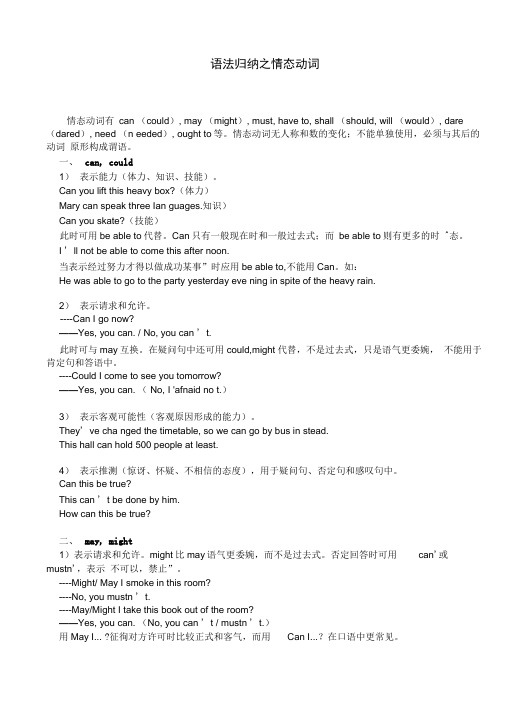
语法归纳之情态动词情态动词有can (could), may (might), must, have to, shall (should, will (would), dare (dared), need (n eeded), ought to等。
情态动词无人称和数的变化;不能单独使用,必须与其后的动词原形构成谓语。
一、can, could1)表示能力(体力、知识、技能)。
Can you lift this heavy box?(体力)Mary can speak three Ian guages.知识)Can you skate?(技能)此时可用be able to代替。
Can只有一般现在时和一般过去式;而be able to则有更多的时 ^态。
I ' ll not be able to come this after noon.当表示经过努力才得以做成功某事”时应用be able to,不能用Can。
如:He was able to go to the party yesterday eve ning in spite of the heavy rain.2)表示请求和允许。
---- C an I go now?——Yes, you can. / No, you can ' t.此时可与may互换。
在疑问句中还可用could,might代替,不是过去式,只是语气更委婉,不能用于肯定句和答语中。
----Could I come to see you tomorrow?——Yes, you can. ( No, I 'afnaid no t.)3)表示客观可能性(客观原因形成的能力)。
They' ve cha nged the timetable, so we can go by bus in stead.This hall can hold 500 people at least.4)表示推测(惊讶、怀疑、不相信的态度),用于疑问句、否定句和感叹句中。
B3UNIT2情态动词+have_done的用法

• 2】 We ________ have proved great adventurers, but we have done the greatest march ever made in the past ten years.
• A. needn't • C. shouldn't B. may not D. mustn't
五、 “might+have+done‖
• 表示对过去事情的推测,might与may意思相
同,但可能性更小。多用于虚拟语气结构 中。
• 1. He might have given you more help, even though he was busy. • 他或许会多给你一些帮助,即使他很忙。 • 2. She might have achieved greater progress, if you had given her more chances. 如果你多给她点机会,她可能已经取得更大的成绩。
―情态动词+have done‖的用法
一、 “must+have+done‖
• 表示对过去事情的肯定推测,译成“一定 做过某事”,该结构只用于肯定句。 • 1. It must have rained last night, for the ground is wet. • 昨晚一定下雨了,因为地面还是湿的。 2. You must have been mad to speak to the servant. 你和仆人说话,一定是发疯了。
• 6. I told your friend how to get to the hotel, but perhaps I ____ have driven her there. • A could • B must • C might • D should
译林版必修四 18-19 Unit 2 Section Ⅲ Grammar——情态动词
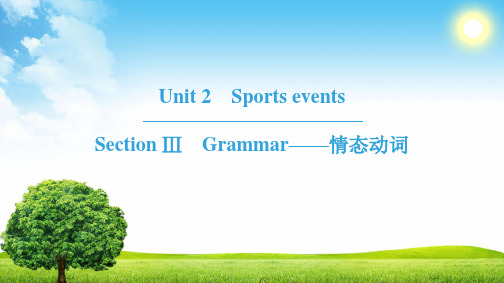
返 首 页
语 境 自 主 领 悟
4.shall (1)表示征询意见,用于第一、第三人称疑问句。 Shall I get you some more tea?
语 法 应 用 落 实
语 法 精 要 点 拨
再来点茶好吗? Shall the boy wait outside? 让那男孩在外面等吗?
返 首 页
返 首 页
语 境 自 主 领 悟
(3)shall 用于第三人称, 表示按照法律、 条文或规定必须做的事, 意为“应, 必须”。
语 法 精 要 点 拨
No reader shall remove a book from the library without permission. 未经许可,读者不准把书带出图书馆。
语 法 应 用 落 实
②There's a lot of noise from next door.They must be having a party.
语 法 精 要 点 拨
③—Must I return all the books in three days? —Yes,you must .(No,you needn't/don't have to ④If you must go,at least wait until the storm is over. .)
语 法 应 用 落 实
返 首 页
语 境 自 主 领 悟
Can you come to the party tomorrow? 明天你能来参加聚会吗? He was a good swimmer so he was able to swim to the riverbank when the
unit2-healthy-eating--grammar情态动词

A.can’t have missed B. could miss C. must have missed D. might miss
2. Oh, I’m not feeling well in the stomach. I
B____ so much fried chicken just now.
might(不用may)+have done表示“本来可能 …”,但实际上没有发生的事。另外,还可表示 “本来应该或可以做某事”之意,含有轻微的责 备语气。
1.You might not have told her. 你本可以不告诉他的。(事实上你告诉他了) 2. You might have come earlier. 你本可以早点来的。(但没有这样)
write
B. couldn’t D. do not have to
5. There is someone knocking at the door. A
it be Tom? A. can B. must C. should D. ought to
6. Two years ago, my husband bought me a bicycle.
A.A. shouldn’t eat B. shouldn’t have eaten B.C. mustn’t eat D. mustn’t have eaten
5. ---Has Mike started? He said he would join in the party.
---He __B__. He is a man of keeping his word.
needn’t +have done表示做了本来不 必去做的事。
必修3 Unit 2 Healthy eating 情态动词(2)
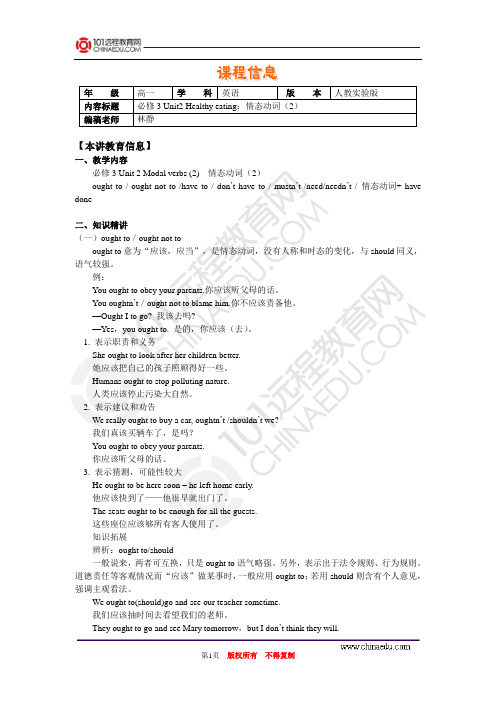
【本讲教育信息】一、教学内容必修3 Unit 2 Modal verbs (2) 情态动词(2)ought to / ought not to /have to / don‘t have to / mustn‘t /need/needn‘t / 情态动词+ have done二、知识精讲(一)ought to/ought not toought to意为“应该,应当”,是情态动词,没有人称和时态的变化,与should同义,语气较强。
例:You ought to obey your parents.你应该听父母的话。
You oughtn‘t/ought not to blame him.你不应该责备他。
—Ought I to go? 我该去吗?—Yes,you ought to. 是的,你应该(去)。
1. 表示职责和义务She ought to look after her children better.她应该把自己的孩子照顾得好一些。
Humans ought to stop polluting nature.人类应该停止污染大自然。
2. 表示建议和劝告We really ought to buy a car, oughtn‘t /shouldn‘t we?我们真该买辆车了,是吗?You ought to obey your parents.你应该听父母的话。
3. 表示猜测,可能性较大He ought to be here soon – he left home early.他应该快到了——他很早就出门了。
The seats ought to be enough for all the guests.这些座位应该够所有客人使用了。
知识拓展辨析:ought to/should一般说来,两者可互换,只是ought to语气略强。
另外,表示出于法令规则、行为规则、道德责任等客观情况而“应该”做某事时,一般应用ought to;若用should则含有个人意见,强调主观看法。
英语:Unit 2 What should I do知识点训练课件(人教新目标八年级下)

15. Get a part-time job: 得到一份兼职工作 16. Borrow sth. from sb. : 从某人那里借什么东西 17.Ask sb. for sth.:请求某人做某事 课堂知识训练 一. 单词拼写: rgue 1 . Lucy and Lily often a__________ with each other. 2 .He has no money. I don’t have, e_________. ither 3. My parents get a t______ for me to teach me English. utor 4. ---How much did you p______ for the book? ---- Ten yuan. ay hould 5. We s_______ look after old people. 二. 单项选择: 1. You shouldn’t _____ here. The baby _____. A. play, sleeping D B.—to play, is sleeபைடு நூலகம்ing C. plays, sleeps D .play, is sleeping A 2. I need ____ some money for my family. What should I do? A. to get B. gets C. getting D .got A 3 .Yesterday I argued ______ Li Lei ____ the thing. A. with, about B. to ,about C. about, with D. to, at 4. Li Ming gave a ticket ___ a film. A. of B. to C. about D. with B 5.When you lose your way, you should ask the policeman ____help. A A. for B. to C. with D. of 6.My best friend gives me _____ than before. A. Fewer advices B B. less advice C. more advices D .some advice “let’s talk _______ the weather .” “OK”. C A. to B. with C. about D. on
五年级下册英语同步拓展Module2 Unit 2 Films 情态动词shall用法 牛津上海版(一起)
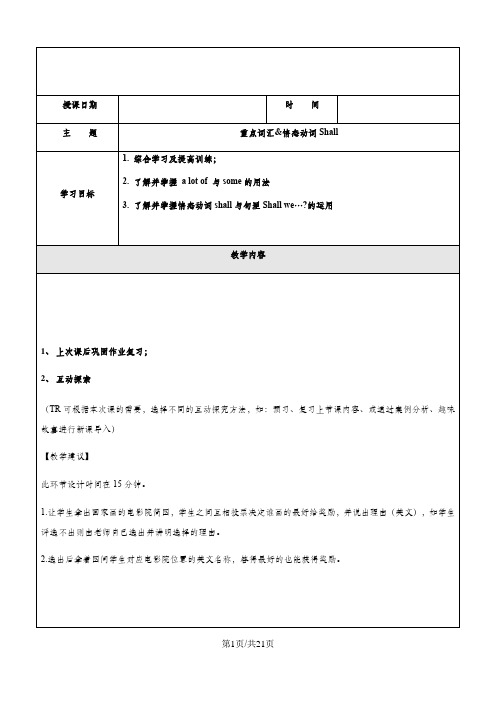
大家拿出上次回家画的电影院简图,一起评选出画的最好的同学,给TA颁发奖品吧!参考词汇:Words (词汇)entrance入口处exit出口film电影see a film看电影seat座位funny有趣的princess公主ticket票ticket office售票处重点词汇&一般过去时特殊疑问句教学建议:此环节教案预期时间60分钟。
1.分为三个部分,词汇梳理、重点语法、音标学习;建议老师能在本次课中让学生默写出本单元的生词,并在春季班的课堂中进行反复巩固;重点语法讲解透测,多通过互动方式进行操练,以理解为主;在音标的学习中,建议老师先帮学生梳理20个元音,再根据每一单元具体讲解;2. 一般过去时的特殊疑问句,建议老师造出一些符合逻辑且与学生生活较为贴近的句子让学生翻译为英文,技能调动学生主动学习的热情又能让学生印象更深刻。
【知识梳理1】重点词汇Words entrance入口处exit出口film电影see a film看电影seat座位(词汇)funny有趣的princess公主ticket票ticket office售票处【例题精讲1】例.根据以下图片说出对应单词Keys:entrance,princess,seat,film,ticket office,exit【巩固练习1】1.翻译句子请找个座位坐下.2.Let’s go (see) a film.3.The (prince) was born and she was so beautiful.4.When I finished watching the film,I couldn’t find the e .Keys:1.Please take a seat.2. to see3.princess4.exit【知识梳理2】重点语法1. a lot of = lots of,意为“许多,大量的”,修饰可数或不可数名词,通常用于肯定句中。
新目标八年级下Unit2重要知识点及练习

三、辨析either、as well、too、also “也” 1.either “也“ 用于否定句尾, 一般用逗号与前句隔开。如; I don‟t like the movie , either. 2. too “也” 用于肯定句尾, 一般用逗号与前句隔开。如; I like the movie , too. 3. also “也“用语句中。如: I also like the movie. 4. as well” 还有、也”,用于句尾。如: I like swimming、running、skating as well .
十二、enough “足够的“ 1.用在形容词、副词后 如: big enough 足够大 large enough 足够大 beautiful enough 足够漂亮 2.用在名词前 如: enough people足够多的人 enough students 足够的学生
【练习】 (C)The new meetingroom is ____ to let ____ in. rge enough; much people B.enough large ;enough people rge enough; enough people D.enough large ;many people
练习:
用 “too either also as well” 填空: 1.He can ______ also drive a car. too 2.I should study hard , ______ . 3.They won‟t be able to get there , _____. either 4.She went Shanghai 、Beijing 、Suzhou ______. as well 5.Kate will be able to be a college student in six years, too. (改为否定句) Kate ______ won‟t be able to be a college student in six years, either _______
必修三unit2语法讲解情态动词用法(最新整理)
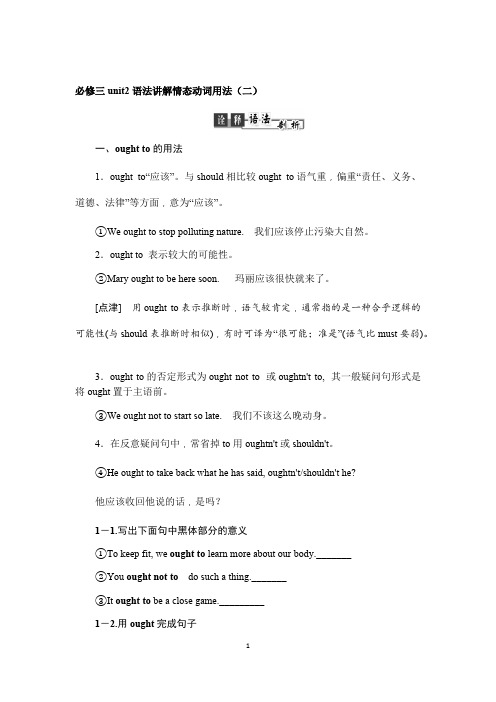
必修三unit2语法讲解情态动词用法(二)一、ought to的用法1.ought to“应该”。
与should相比较ought to语气重,偏重“责任、义务、道德、法律”等方面,意为“应该”。
①We ought to stop polluting nature. 我们应该停止污染大自然。
2.ought to 表示较大的可能性。
②Mary ought to be here soon. 玛丽应该很快就来了。
[点津] 用ought to表示推断时,语气较肯定,通常指的是一种合乎逻辑的可能性(与should表推断时相似),有时可译为“很可能;准是”(语气比must要弱)。
3.ought to的否定形式为ought not to 或oughtn't to, 其一般疑问句形式是将ought置于主语前。
③We ought not to start so late. 我们不该这么晚动身。
4.在反意疑问句中,常省掉to用oughtn't或shouldn't。
④He ought to take back what he has said, oughtn't/shouldn't he?他应该收回他说的话,是吗?1-1.写出下面句中黑体部分的意义①To keep fit, we ought to learn more about our body._______②You ought not to do such a thing._______③It ought to be a close game._________1-2.用ought完成句子④你不该责备他。
You ____________(scold )him.⑤我明天该动身吗?—______________(_leave )tomorrow?是的,你应该。
—Yes, you_ought_to.⑥我们现在应该走,是吗?We ought to go now, ____________?二、have to, don't have to与mustn't的用法1.have to(口语中常用have got to)表示客观需要做的事情,意为“必须;不得不”。
英语:Unit2《Sporting events》情态动词公开课课件(译林牛津版必修4)
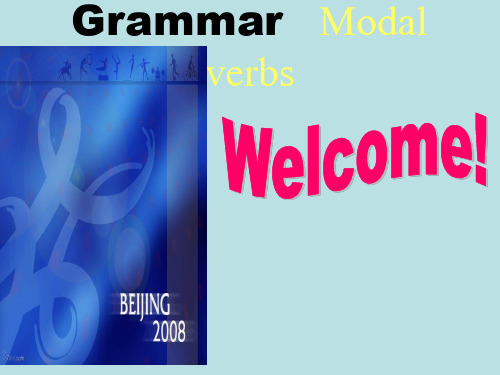
Notice:
(1). be able to表示能力 有人称和数的变化 表示能力, 表示能力 有人称和数的变化, 可用于各种时态; 可用于各种时态 (2). can表示客观可能性 常指现在 较常用 表示客观可能性, 表示客观可能性 常指现在, 较常用, 过去式为 “could”; ” 如果只表示能力时 只表示能力时, 如果只表示能力时 can=be able to (3). could仅表示过去具备某种能力 而 仅表示过去具备某种能力, 仅表示过去具备某种能力 was/were able to表示不仅具备而且 表示不仅具备而且 实施了某种能力;更侧重于 更侧重于“ 实施了某种能力 更侧重于“克服一定困难 经过一定努力做成某事” 经过一定努力做成某事” = managed to do sth. = succeeded in doing sth.
Warming-up exercises
can 1. He ____ speak English fluently. (表能力 表能力) 表能力 must 2. You _____ work hard to win the gold medals. (表责任/义务 表责任/ 表责任 义务) 3. ______we do some exercises this Shall morning? (表征求对方意见 表征求对方意见) 表征求对方意见 4. --- Might I watch TV after supper? A ---Yes, you ________. A. may B. must C. might D. could 5. ---May I pick a flower in the garden? ---________. C A. No, you need B. No, please C. No, you mustn’t D. No, you won’t ’ ’
人教课标版必修3英语Unit2 单元语法详解
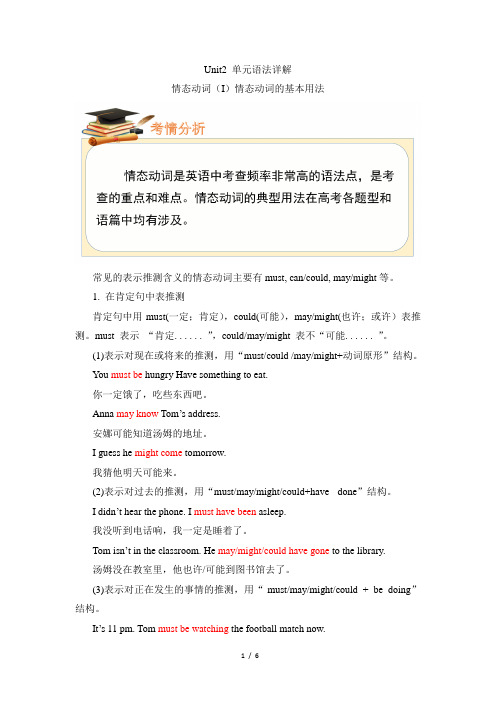
Unit2 单元语法详解情态动词(I)情态动词的基本用法常见的表示推测含义的情态动词主要有must, can/could, may/might等。
1. 在肯定句中表推测肯定句中用must(一定;肯定),could(可能),may/might(也许;或许)表推测。
must 表示“肯定. . . . . . ”,could/may/might 表不“可能. . . . . . ”。
(1)表示对现在或将来的推测,用“must/could /may/might+动词原形”结构。
You must be hungry Have something to eat.你一定饿了,吃些东西吧。
Anna may know Tom’s address.安娜可能知道汤姆的地址。
I guess he might come tomorrow.我猜他明天可能来。
(2)表示对过去的推测,用“must/may/might/could+have done”结构。
I didn’t hear the phone. I must have been asleep.我没听到电话响,我一定是睡着了。
Tom isn’t in the classroom. He may/might/could have gone to the library.汤姆没在教室里,他也许/可能到图书馆去了。
(3)表示对正在发生的事情的推测,用“ must/may/might/could + be doing”结构。
It’s 11 pm. Tom must be watching the football match now.现在是晚上十一点,汤姆肯定正在看球赛。
例1单句填空——I am sure I saw Brian in the park this morning.——You be imagining things. He left for America last night.解析考查情态动词。
Unit 2 Sports events情态动词II知识梳理

Unit 2 Sports events情态动词(II)概念引入Such things ought not to be allowed. 这类事不该容许。
He said I ought to write an article about it. 他说我应当写一篇文章谈这事。
I ought to be fit for work next month. 下个月我想必可以工作了。
I don’t think you ought to have done that. 我想你不应该这样做的。
上一单元我们学习了英语中的大部分的情态动词,本单元我们会重点学习ought to的用法,并小结一下表示推测的情态动词,及三个用法与情态动词的相同的短语had better,used to和would rather。
语法讲解ought to的用法讲解1. 与众不同的ought toought to是一个比较奇怪的情态动词,因为其他所有情态动词都后接动词原形,而ought to虽然也是后接动词原形,但却无意中构成了ought to do sth结构,其中的to do sth.便是一个典型的带to不定式,并且ought to do sth在用法上也是基本上将ought与to do sth 分开使用——如构成疑问句,只需将ought提前,而不是将ought to提前;构成否定式时,是在ought后面加上not,而不是在ought to的后面加not。
如:Ought I to tell her the truth? 我应该把真实的情形告诉她吗?We ought to be careful,oughtn’t we? 我们应该小心,对吧?Oughtn’t he to see a doctor? 他是不是该去看医生?You oughtn’t to stay out so late. 你不应当在外面待到这样晚。
在美国英语中,ought to用于否定句和疑问句时可将其中的to省略。
人教版八年级英语下册unit 2 知识点+语法情态动词.ppt
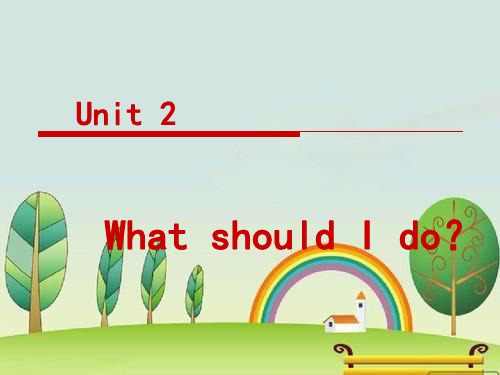
【答案与解析】A。 情态动词可表达建议、要求、 可能和意愿I’d love to.是“我很乐意”; Never mind. 是“不介意”;It doesn’t matter. 是“没关系”; 只有A符合题意。
小试牛刀
There ________ more people in the next 5 years. A. is B. are C. will have D. will be
情态动词表示“可能”或“预测”
will 和 would 用于表示“预测”或“习惯性”: 1. I think he will be all right now. (will be 表 示一定会) 我想他现在一定好了。
2. That would be his mother. (would be 表示 肯定是)那肯定是他母亲。
【答案与解析】B。因为是与朋友吵架了,所以应该说对不起。 should是情态动词,它的基本用法是必须和其他动词一起构成 谓语。情态动词没有人称和数的变化,意为“应该……”。 should(应当,应该)用于所有人称,表示劝告或建议。因此 选B。
小试牛刀
— Will you please stay here for the party?
maybe一般放在句首,引导句子。may be由情态动词may 加系动词原形be构成。其后所接词决定于be,可以是名词、 形容词等,一般放在句中。
Maybe he is John’s father. 也许他是约翰的父亲。 He may be a student. 也许他是一名学生。
知识点
call up…表示“打电话…”可以与名词、代 词连用。连接代词时,把代词放在call与up 之间。 Please call me up. Don’t forget to call up your uncle
- 1、下载文档前请自行甄别文档内容的完整性,平台不提供额外的编辑、内容补充、找答案等附加服务。
- 2、"仅部分预览"的文档,不可在线预览部分如存在完整性等问题,可反馈申请退款(可完整预览的文档不适用该条件!)。
- 3、如文档侵犯您的权益,请联系客服反馈,我们会尽快为您处理(人工客服工作时间:9:00-18:30)。
You failed in the exam, you should have studied harder. 2.shouldn’t have done不该做的却做了
You are late for school again, you shouldn’t have got up late. 3. could have done 本能做的没做
5. must have done 过去一定做某事 It’s already time. He must have forgotten the meeting.
6.needn’t have done 表示本来不必做而实际上 却做了 You needn’t have eaten all the food.
2. What a pity. Considering his ability and experience, he ____________ better.
A .need have done B. must have done
C. can have done D. might have done
He could have said sorry to his wife, but he didn’t want to give up first.
4. couldn’t have done过去不可能做某事 He couldn’t have gone to Shanghai, for we were in the same meeting just now.
1. ---I am sorry. I ________ at you the other day. ---- Forget it. I was a bit out of control that day. A .shouldn’t shouted B. shouldn’t have shouted C. mustn’t shouted D. mustn’t have shouted
• ----Thanks. You ____________ it. I could manage it myself.
A .needn’t do B. needn’t have done C. mustn’t do D. shouldn’t have done
3.I told your friend how to get to the hotel, but perhaps I _______ have driven her there.
A .could
B. must
C. might
D. should
• 4. Catherine, I have cleaned the room for you.
